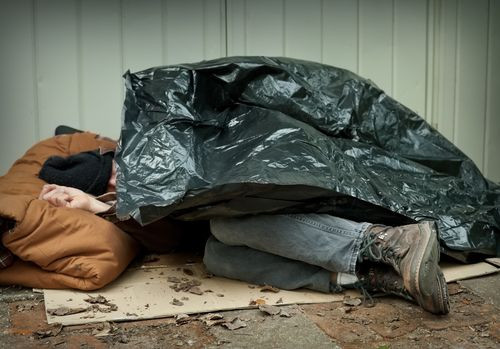Homeless With History Of TBI More Likely To Visit ER And More Likely To Be Arrested

Traumatic brain injuries, such as concussions, are about seven times more common among homeless people than the general population. Now a new study from Canada finds that homeless and vulnerably housed people who have suffered a traumatic brain injury at some point in their life are more likely to visit the ER. The sad news doesn't end there; they are also more likely to be arrested or incarcerated and also to become victims of physical assault. "Screening homeless and vulnerably housed people for TBI and helping them to better manage behaviors after brain injuries could help improve outcomes and potentially reduce the use of costly health care and legal services," said Matthew To, the lead author of the published paper and a research student at St. Michael's Hospital.
Causes of TBI
What separates a regular brain injury from Traumatic Brain Injury or TBI? TBIs are caused by bumps, blows, or jolts to the head as well as penetrating head injuries that disrupt the normal function of the brain. Doctors rate the severity of a TBI as “mild” when only a brief change in mental status is involved — momentary unconsciousness, say — and as “severe” when an extended period of unconsciousness or amnesia occurs after the injury. Not all head injuries, then, can be said to result in a TBI, but sometimes this is difficult to diagnose. Concussions, for instance, are considered a mild TBI, and though they often occur when someone falls or suffers a head or body blow, they may also be caused when the head and brain move quickly back and forth. Because it is not always crystal clear, some people don't realize they may have injured themselves immediately. In any event, people who have suffered a TBI sometimes develop other health problems, such as seizures, mental health problems, alcohol and drug misuse, and poorer overall physical and mental health.
To understand the relationship between a history of TBI and use of health services, researchers focused on inner city use of health care facilities, especially emergency departments in three major Canadian cities: Vancouver, Toronto, and Ottawa. Accessing the ongoing Health and Housing in Transition (HHiT) study, the researchers selected 1,181 participants from the population of homeless and vulnerably housed adults, who were single and 18 years or older. Data for 82 percent of those participants (968 people) were available at the one-year follow-up mark.
The researchers collected information using structured, in-person interviews at the start of the study in 2009 and then again about one year afterward. Of all the selected participants, 61 percent said they had suffered a TBI in their lifetime (69 percent in Vancouver, 64 percent in Ottawa and 50 percent in Toronto).
Focusing on this subgroup of participants with a history of TBI, the researchers discovered they were about 1.5 times more likely to have visited an ER in the previous year, which they tentatively attributed to the long-term cognitive effects of the TBI. The researchers based this theory on previous research, which suggests people with TBI are high users of health care services up to five years after their injury. Lead author Dr. Stephen Hwang, Centre for Research on Inner City Health, noted that high ER use could also be related to health problems related to the TBI, such as seizures or substance use.
The researchers also discovered participants with a history of TBI were almost twice as likely to have been arrested or incarcerated in the previous year. Hwang said this could be due to impaired cognition or personality disturbances following the brain injury. Finally, the participants with TBI history were also nearly three times more likely to have experienced a physical assault in the previous year. Because no other research has made this link, this study is groundbreaking — the first ever to suggest that sustaining a TBI may be an independent risk factor for becoming a future victim of physical assault.
“These findings have public health and criminal justice implications and highlight the need for effective screening, treatment, and rehabilitation for TBI in this population,” concluded the authors.
Source: To M, O’Brien K, Palepu A, et al. Healthcare Utilization, Legal Incidents, and Victimization Following Traumatic Brain Injury in Homeless and Vulnerably Housed Individuals: A Prospective Cohort Study. The Journal of Head Trauma Rehabilitation. 2014.
Published by Medicaldaily.com



























